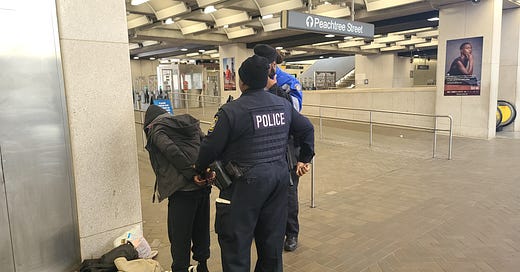Turnstile Priorities
MARTA will arrest a homeless person for evading a $2.50 fare while the city of Atlanta returns $10 million in unspent housing supports.
I had lunch with a young woman who called herself Christian, an hour after MARTA police arrested her for turnstile jumping at Five Points. Again.
Yesterday morning, I was walking out of Five Points to go watch nothing happen during jury selection at the YSL trial, when I stumbled upon three MARTA cops snagging people who squeezed through the turnstiles w…
Keep reading with a 7-day free trial
Subscribe to The Atlanta Objective with George Chidi to keep reading this post and get 7 days of free access to the full post archives.




